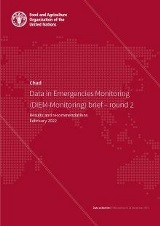Publications
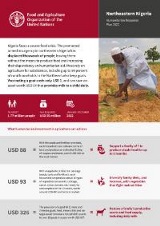
Northeastern Nigeria: Humanitarian Response Plan 2022
04/2022
Nigeria faces a severe food crisis. The protracted armed insurgency in northeastern Nigeria has displaced thousands of people, leaving them without the means to produce food and increasing their dependency on humanitarian aid.
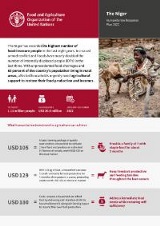
The Niger: Humanitarian Response Plan 2022
04/2022
The Niger has recorded its highest number of food-insecure people in the last eight years. Increased armed conflict and floods have nearly doubled the number of internally displaced people in the last three.
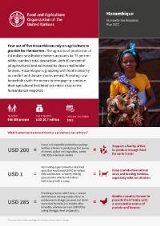
Mozambique: Humanitarian Response Plan 2022
04/2022
Four out of five Mozambicans rely on agriculture to provide for themselves. The agricultural production of 4.6 million smallholder farmers accounts for 75 percent of the country’s total production, with 90 percent of all agricultural land cultivated by these smallholder farmers.
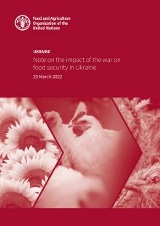
Ukraine: Note on the impact of the war on food security in Ukraine
03/2022
FAO is deeply concerned about the food security situation in Ukraine. The war that began on 24 February 2022 has caused extensive damage and loss of life in key population centres, spread across rural areas, and sparked massive displacement.

Assessing the impacts of the COVID-19 pandemic on the livelihoods of rural people
03/2022
In this paper we focus specifically on differences in the welfare impacts of COVID-19 on rural livelihoods between countries using nationally representative data that we disaggregate by food system typology.
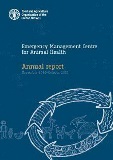
Emergency Management Centre for Animal Health: Annual report
02/2022
The Emergency Management Centre-Animal Health (EMC-AH) activity report reflects how through the core pillars of its strategic action plan: preparedness, response, incident coordination, collaboration and resource mobilization, EMC-AH contributed to strengthening resilience of livelihoods to animal health-related emergencies and zoonoses.
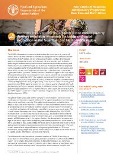
Economic inclusion and social protection to reduce poverty
12/2021
Poverty reduction, economic inclusion and social protection in the Near East and North Africa region
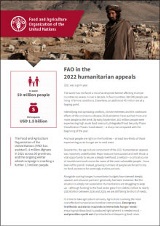
Appels humanitaires de la FAO en 2022
12/2021
L’aide d'urgence aux moyens d’existence permet de répondre à des besoins immédiats liés à la faim, des aliments nutritifs étant ainsi produits là où la nécessité se fait le plus sentir, et offre un moyen de sortir de crises alimentaires qui ne font que se prolonger et s’aggraver.
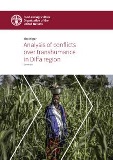
The Niger: Analysis of conflicts over transhumance in Diffa region
11/2021
Located in the eastern part of Niger, Diffa region is a vast semi-arid expanse, where the balance between agricultural and pastoral activities is being disrupted by new competition for natural resources and also by conflict between indigenous livestock farmers and transhumant pastoralists.
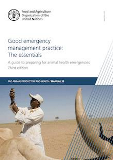
Good emergency management practice: The essentials
11/2021
Animal health emergencies are evolving, but they remain among the most challenging situations a country can confront. Infectious diseases and other threats have increasing potential to spread rapidly within a country or around the world due to growing populations, concentration of animal populations and market intensification, human and animal movement, and global trade.
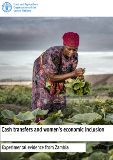
Cash transfers and women's economic inclusion
11/2021
This paper investigates whether an increase in exogenous income through the Child Grants model of the Social Cash Transfer programme in Zambia fosters economic inclusion among rural women.
Burkina Faso, Mali et Niger: Analyse des conflits liés aux ressources naturelles dans les trois pays du Liptako‑Gourma
11/2021
Dans le contexte actuel du Sahel, la montée des conflits et des antagonismes liés aux ressources naturelles suscite des préoccupations d’autant plus fortes que ces conflits constituent un enjeu social, économique et politique particulièrement important.
Burkina Faso, Mali et Niger: Plan de réponse régional (août 2021-décembre 2022)
10/2021
Située au coeur de la bande sahélo-saharienne, la région du Liptako‑Gourma s’étend sur une large zone de 370 000 km2 où vit une population d'environ 10,8 millions d’habitants en 2021 dont 2,3 millions personnes sont estimées en situation d’insécurité alimentaire aiguë (juin-août 2021).
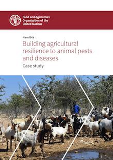
Namibia: Building agricultural resilience to animal pests and diseases
10/2021
This case study focuses on the Republic of Namibia’s ex ante approach to preventing, controlling, and managing animal pest and disease outbreaks, which are often exacerbated by climate-related disasters, such as floods and droughts.
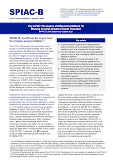
Key COVID-19 Lessons and Recommendations for Working Towards Universal Social Protection
10/2021
The paper contains a joint statement by the Social Protection Interagency Cooperation Board (SPIAC-B), a coordination mechanism comprising of a broad swath of intergovernmental and bilateral agencies engaged in social protection, drawing from the lessons drawn in the social protection response to the COVID-19 pandemic.
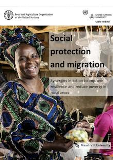
Social protection and migration
10/2021
This publication was developed by the Maastricht Graduate School of Governance (UNU-Merit) in partnership with FAO. The policy paper is conceived as a framing paper, which conceptualizes the relationship between social protection, migration, and rural development, and strengthens these synergies for FAO’s programming.
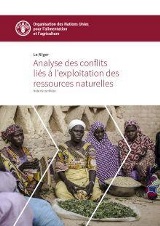
The Niger - Analysis of conflicts related to the exploitation of natural resources (IN FRENCH)
09/2021
L’analyse des conflits liés à l’accès aux ressources naturelles au Niger a permis de mettre en évidence l’ampleur et la complexité de ces conflits.
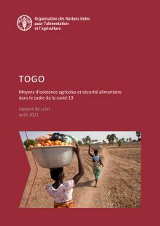
Togo: Agricultural livelihoods and food security in the context of COVID-19 (IN FRENCH)
09/2021
Ce rapport propose une analyse des effets de la maladie à coronavirus 2019 (covid-19) sur le système agroalimentaire du Togo, en se basant sur l’évaluation menée en février 2021.
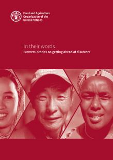
In their words: Farmers' stories of getting ahead of disasters
09/2021
Anticipatory action is the practice of forecasting disasters and acting before they occur or reach their peak.

